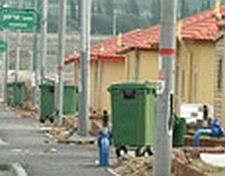Harassment of Gush Katif Evictees Continues

Excerpts;
Elazri said that he has received a portion of his government-promised compensation payments, “but it’s not anything near what we were promised. I need something to do! Our monthly expenses are very high, including buying totally new furniture and kitchen equipment, and yet I spend my days doing absolutely nothing. It’s terrible for me, and it’s bad for my children to see me this way.”
Elazri’s partner, Avraham Ben-Hamu, said he hopes that other displaced residents will join them in their initiative to stand in protest at the intersection.
Elazri said he is even considering writing to UNRWA – the United Nations Relief and Works Agency – to ask for its help in alleviating his suffering as a refugee.
Another family, thrown out of Moshav Katif and slated to live in Amatzia, was told to split up into two caravans. Contrary to promises given by the government’s Sela [Aid to Gaza Evacuees] Administration, the family was assigned a 75-square-meter [807-square foot] caravan – instead of the 110 meters to which they are eligible. The mother of the family, Tammy, told Katif.net, “When we refused to take the 75-meter caravan, they wanted us to split up into two – half the family should sleep in one caravan, and half in the other.”
This offer was made on the eve of the Passover holiday, when the family was told it had to leave the Shalom Hotel in Jerusalem. The family had been housed there for the past several months. After predictably refusing the split-up offer, the family was told it had to move to the Gold Hotel, “where we received three small rooms, with no place to put our stuff. We asked for another room, but were refused.”
Tammy said that the government has “promised us that they will start enlarging our caravan this week; we have been promised many things, and can only hope that they will really finish it within a month and that our whole family will be able to spend the night together in one place.”
Atty. Yossi Fuchs, of the Land of Israel Legal Forum that has been volunteering its legal services on behalf of the uprooted residents for more than a year, said in response: “The State is not fulfilling its promise to provide temporary quarters for the evicted residents until their permanent homes are ready. The government is already talking about plans for another uprooting, but is unable to deal properly with those it uprooted the first time.”
Meanwhile, after a short delay caused by the government’s failure to live up to contractual agreements with Kibbutz Ein Tzurim, construction on temporary housing for evicted Netzer Hazani residents in Ein Tzurim continues. Some 60 families from N’vei Dekalim have already moved into the site, and several dozen more from Netzer Hazani are hoping to move in within a month or so. “We were promised that it would be ready for Passover, and now they’re saying it will be before Shavuot,” former Netzer Hazanite Aviel Tucker told Arutz-7. “Maybe this time it really will be ready.”
